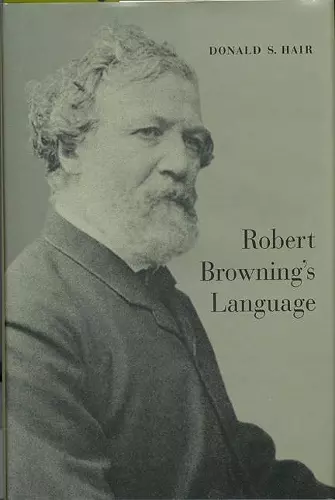Robert Browning's Language
Format:Hardback
Publisher:University of Toronto Press
Published:21st Aug '99
Currently unavailable, our supplier has not provided us a restock date

'No critic of Browning is more thorough in his approach to language than Hair. His chapters cover almost every conceivable aspect of language from sound (in a masterful chapter on rhyme) to syntax, from words to dramatic genres ... Hair patiently establishes the link between one context or theory of language and another, his argument rounding to completion without a patch of obscurity anywhere.' -- Glen Wickens, Department of English, Bishops University 'I believe that Professor Hair has significantly extended our understanding of Victorian manipulations of typology. Hair makes a detailed examination, from many angles, of Browning's concept and use of language, and I expect this book to be one of the essential works in Browning studies for some time to come.' -- Margot Louis, Department of English, University of Victoria
Attempts to define Browning's understanding of the nature and use of words and syntax by considering a full range of his texts, the ideas important to him, his historical context, and the other artistic passions that played a part in his life.What are the influences that shaped the language used by one of the nineteenth century's greatest writers? How did his religious beliefs, the books he owned, the paintings and music he loved, affect almost sixty years' output of poems, plays, essays, and letters? This book attempts to define Browning's understanding of the nature and use of words and syntax by considering not only a full range of texts from the 1833 Pauline to the 1889 Asolando, but also the ideas important to Browning, the historical context in which he lived, and the other artistic passions that played a part in his life. In this companion volume to Tennyson's Language, Donald Hair establishes Browning's place at the crossroads between empirical and idealist traditions and explains his "double view" of language, arguing that both Locke and the Congregationalists found language to be at the same time empty and a God-given essential. The Victorian age's anti-theatrical bias, which Browning came to share, and his reading of predecessors, principally Quarles, Bunyan, Donne, and Smart, also shaped his understanding of the diction of poetry. Hair conceives of Browning's language as a theoretical whole, encompassing words, genres, rhyme, syntax, and phonetics. He also links Browning's interest in music with his rhyming, the most essential and characteristic feature of his prosody, and relates his interest in painting to the interpretation of the visual image in the emblem and in typology.
- Winner of Raymond Klibansky Prize, Canadian Foundation for the Humanities & Social Sciences 2000 (Canada)
ISBN: 9780802044341
Dimensions: 236mm x 158mm x 29mm
Weight: 674g
368 pages